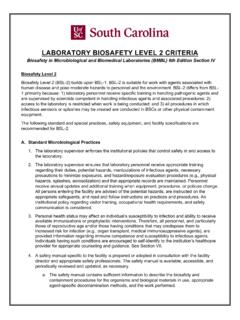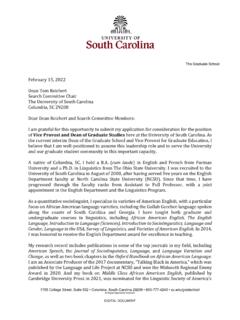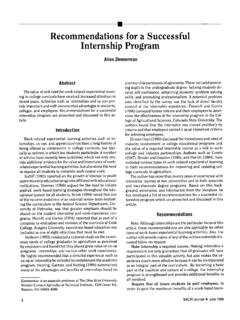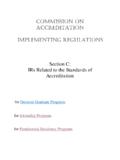Transcription of Writing Letters of Recommendation - University of South ...
1 1 Writing Letters of Recommendation A Guide for USC-SOM Greenville Faculty Josh Brownlee, MD Overview Letters of Recommendation (LORs) are an important part of a student s application for residency training. In a NRMP survey of residency program directors, LOR s ranked second only to USMLE Step 1 scores in deciding which applicants a program will interview. Further, most program directors cited LORs as an important factor in ranking candidates for the Match. LORs are important because they convey far more about a candidate than grades, scores and class rank. Residency programs use them to learn about the student s clinical judgment, technical abilities, interpersonal skills and professional attributes. Although this guide is intended to assist faculty members who have agreed to write a letter on behalf of a medical student for their residency application, it may also be useful for LORs for other purposes.
2 Prerequisite You can write a supportive letter from firsthand knowledge of the student (personally, not just by reputation) o As a clinical faculty member ( , attending, community preceptor, etc.) o As a research advisor o As a faculty mentor for the student in another area ( , student started an educational program for children, student developed a healthy eating program for overweight adults, etc.). These are useful as a 4th LOR if the student played a major role in developing/implementing the program. When to say No LORs from preclinical faculty (except for research advisors) or residents are not useful for residency applications You do not know the student well enough or you cannot write a strong or supportive letter ( , if you did not work with the student very long or did not have a good experience) The student s deadline is unreasonable for you and your schedule. Do not say yes if you cannot meet the deadline.
3 Missing LORs or not having LORs submitted on time can cost students their interviews. If you cannot write a supportive letter of Recommendation let the student know that he/she should request a letter from someone else. 2 Information You Need from the Student If your interaction with the student has been longstanding or recent you may be able to write the letter without meeting face to face with the student. If your interaction with the student is more remote or you would like more specific information to include in the LOR, you may want to find time to meet with the student. o Learn about why they became interested in medicine o Learn about why they have chosen the particular field of medicine o Learn about any research or advocacy they have been involved in o Learn about their interests outside of medicine o Learn about their specific career goals after residency (private practice, academics, sub-specialize, etc.)
4 O Is there a specific attribute they would like you to comment on in the letter? o It may have been quite some time since you worked with the student so it is ok to ask if there is a particular patient experience or case they remember from your time working together. It may have been just another visit to you, but may have been eye-opening for them. o Ask if the letter should be specialty specific (this candidate will be an excellent Ob/Gyn) or general (this candidate will be an excellent and hardworking resident)? The student should provide you with: o A Request for Letter of Recommendation Coversheet (For ERAS only). This will include the students AAMC ID# and submission guidelines. All ERAS LORs will need to be up-loaded to the website in PDF format. If you need assistance with this process please contact Tiffany Hughes o Curriculum Vita (CV) o Personal statement. This may still be in draft form depending on when they ask for the LOR.
5 Feel free to give them advice on revising if it has not yet been submitted. o The date the letter must be submitted by. Check to see if they do or do not waive their right to see the letter. It is generally recommended that the student waive this right to ensure an honest letter. Non-ERAS programs : The letter requirements for these programs are different and may require you to mail the Letters directly to the student or program. The student must provide you with this information. Timing It is best to write a letter immediately after the student has completed your rotation or after your meeting with the student, while details are fresh in your mind. Encourage students, especially 4th-year AIs, to let you know early on if they would like a letter. You can offer to write a letter for an outstanding student, especially for 3rd-year students who may not be planning their applications yet. 3 You and the student should collaboratively set a deadline for letter submission.
6 Consider having the student email you a reminder 6-8 weeks out from the deadline if they ask you early in the year. As a courtesy, you can email the students once you have submitted the LOR. They can also see if the letter has been submitted by reviewing their ERAS account. You do not need to let them review the letter prior to submission if they have waived their right to review the letter. Of course f you would like to share the letter with the student you may. Content of a Letter Keep in mind that the primary function of a LOR is to communicate the qualities of the student that are difficulty to capture in test scores and course grades. Do Include: o Your relationship with the student o How long and in what context you know the student o A professional, but personal tone. Use Mr. and Ms. instead of first names. o Accurate descriptions and specific examples of the student s abilities avoid either exaggeration or overly vague/generic descriptors o Statistics when possible ( , Ms.)
7 Jones is among the top 5% of students with whom I have worked this year, or top 25% of students I ve worked with in my career ) o Any position titles, including faculty appointments, in your signature. The more important you appear to be, the more weight your letter will have. Don t Include: o Inaccurate information o Negative comments. In describing any weaknesses, consider whether you can frame them positively ( , demonstrated improvement in rather than demonstrated poor documentation ) o A recitation of the students CV or information available from test scores, personal statement, etc. o Any mention of the student s race, sexual orientation, marital status, child status, etc. unless the student expressly asked you to do so. If you think commenting on these topics in some way will make for a stronger letter, discuss it with medical school staff and the student before including. 4 Organization of a Typical Letter of Recommendation Length: A strong letter is generally at least 1 full page, but do not go over 2 pages.
8 Address to: Dear Program Director Opening Include student name and AAMC ID# Purpose of letter ( , I am Writing to support Ms. X s application to your residency .. Nature and length of your relationship with the student Your experience in teaching (how long, at what level, etc.) Include in your letter whether the student has waived his/her right to see the letter Body 1-3 paragraphs Focus on the student s strengths. Try to include 3-5 of the topics below. Discussing fewer topics in more detail is preferable to generic statements about all topics. Share specific details about the student s performance, generally focusing on your observations of them in the clinical arena. Topics to consider include: o Fund of knowledge o Medical decision making o Specialty-specific information (OR skills, proficiency at counseling, etc.) o Technical abilities o Communication o Team work o Leadership characteristics or experiences o Passion for medicine or specialty o Professionalism o Outstanding professional/personal traits, such as worth ethic o Share ways the student went above and beyond what was expected o Share comments from team members, patients or families Closing Reiterate the strength of your overall Recommendation Student s potential as a House Officer or physician in their chosen field Would you recruit this student to your program?)
9 Your signature (may be electronic) 5 When you ve finished Proofread!!!!!! Especially the student s name and gender pronouns! Particularly if you are using another letter as a template (we don t recommend using another student s letter as a template due to the risk of sounding too generic and/or including inaccurate information in the LOR). Consider having someone else proofread the letter. Letter must be on letterhead and signed. The final signed draft should be saved as a PDF and uploaded to the ERAS website. Keep an electronic copy. These can be helpful to review when Writing future Letters , and as a backup if needed again for this particular student. 6 SAMPLE LETTER OF Recommendation STRONGER Applicant Name: Ian Harris Applicant AAMC ID: 55555555 Date: 8/25/2018 Dear Program Director, It is my pleasure to write this letter in support of Mr. Ian Harris s application to your residency program.
10 I have been an educator for decades with considerable experience with learners at all levels of medical training. I have observed Mr. Harris in both the inpatient and outpatient setting, taught him in class, and overseen his performance during his clerkship and acting internship . He has waived his right to review this letter. As is evident from his CV, Mr. Harris has excelled throughout his career with many notable accomplishments which I will not repeat here. I will focus on my experiences with Mr. Harris, primarily those related to his clinical abilities and which demonstrate the qualities necessary for your residency: excellent knowledge, clinical skills, patient care, and leadership. In addition to considerable intellect and exemplary performances on standardized examinations, Mr. Harris is a warm, engaging individual who teaches others by example, is inclusive, and consistently exhibits curiosity and motivation to learn.







